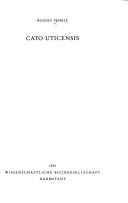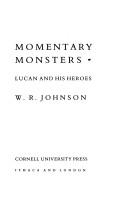| Listing 1 - 7 of 7 |
Sort by
|
Book
ISBN: 9780190869021 019086902X 9780190869038 0190869038 0190869046 0197604374 Year: 2019 Publisher: New York, NY : Oxford University Press,
Abstract | Keywords | Export | Availability | Bookmark
 Loading...
Loading...Choose an application
- Reference Manager
- EndNote
- RefWorks (Direct export to RefWorks)
Marcus Porcius Cato ("the Younger") is most famous for being Julius Caesar's nemesis. His sustained antagonism was in large part responsible for pushing the Romans towards civil war. Yet Cato never wanted war even though he used the threat of violence against Caesar. This strategic gamble misfired as Caesar, instead of yielding, marched on Rome, hurling the Republic into a bloody civil war. Refusing to inhabit a world ruled by Caesar, Cato took his own life. Although the Roman historian Sallust identified Cato and Caesar as the two most outstanding men of their age, modern scholars have tended to dismiss Cato as a cantankerous conservative who, while colorful, was not a critical player in the events that overtook the Republic.This book, in providing a much-needed reliable biography of Cato, contradicts that assessment. In addition to being Caesar's adversary, Cato is an important and fascinating historical figure in his own right, and his career-in particular, his idiosyncrasies-shed light on the changing political culture of the late Republic. Cato famously reached into Rome's hallowed past and found mannerisms and habits to adopt that transformed him into the foremost champion of ancestral custom. Thus Cato did things that seemed strange and even bizarre such as wearing an old-fashioned tint of purple on his senatorial toga, refusing to ride a horse when on public business, and going about barefoot and without the usual tunic as an undergarment. His extreme conservatism-which became celebrated in later ages, especially in Enlightenment Europe and revolutionary America--was actually designed to give him a unique advantage in Roman politics. This is not to claim that he was insincere in his combative promotion of the mos maiorum (the way of the ancestors), but his political manipulation of the Romans' reverence for their traditions was masterful. By providing a new, detailed portrait of Cato, the book also presents a unique narrative of the age he helped shape and inadvertently destroy.
Cato, Marcus Porcius, --- Cato, M. Porcius --- Cato, --- Cato Uticensis, Marcus Porcius, --- Catone, --- Uticensis, Marcus Porcius Cato, --- Rome --- History --- Cato, Marcus Porcius, - 95 B.C.-46 B.C
Book
ISBN: 9780814211656 0814211658 0814270638 0814256848 Year: 2011 Publisher: Columbus : Ohio State University Press,
Abstract | Keywords | Export | Availability | Bookmark
 Loading...
Loading...Choose an application
- Reference Manager
- EndNote
- RefWorks (Direct export to RefWorks)
Situating the beginnings of Latin prose -- Under the Roman sun : poets, rulers, translations, and power -- Conflicting scenarios : traffic in others and others' things -- Inventing Latin prose : Cato the Censor and the formation of a new aristocracy -- Power differentials in writing : texts and authority.
Latin prose literature --- Latin prose literature. --- Proza (teksten) --- Prosa. --- History and criticism. --- Cato, Marcus Porcius, --- Cato, M. Porcius, --- Cato, Marcus P. --- Cato, Marcus Porcius (Censorius) --- Criticism and interpretation. --- Proza (teksten). --- Cato, Marcus Porcius (Censorius). --- History and criticism --- Cato, --- Caton, --- Kato, Marcus Porcius, --- Katon, Mark Port︠s︡iĭ, --- Cato, Marcus Porcius
Book
ISBN: 8478823603 Year: 2000 Publisher: Madrid : Ediciones Clásicas,
Abstract | Keywords | Export | Availability | Bookmark
 Loading...
Loading...Choose an application
- Reference Manager
- EndNote
- RefWorks (Direct export to RefWorks)
Latin literature --- Statesmen in literature --- Women and literature --- Women in literature --- Woman (Christian theology) in literature --- Women in drama --- Women in poetry --- History and criticism --- Cornelia, --- Cato, Marcus Porcius, --- Cato, M. Porcius --- Cato, --- Cato Uticensis, Marcus Porcius, --- Catone, --- Uticensis, Marcus Porcius Cato, --- In literature.

ISBN: 161487767X 9781614877677 086597442X 9780865974425 0865974438 9780865974432 Year: 2004 Publisher: Indianapolis Liberty Fund
Abstract | Keywords | Export | Availability | Bookmark
 Loading...
Loading...Choose an application
- Reference Manager
- EndNote
- RefWorks (Direct export to RefWorks)
"A day, an hour, of virtuous liberty is worth a whole eternity in bondage." -Joseph Addison, Cato 1713 Joseph Addison was born in 1672 in Milston, Wiltshire, England. He was educated in the classics at Oxford and became widely known as an essayist, playwright, poet, and statesman. First produced in 1713, Cato, A Tragedy inspired generations toward a pursuit of liberty. Liberty Fund's new edition of Cato: A Tragedy, and Selected Essays brings together Addison's dramatic masterpiece along with a selection of his essays that develop key themes in the play. Cato, A Tragedy is the account of the final hours of Marcus Porcius Cato (95-46 B.C.), a Stoic whose deeds, rhetoric, and resistance to the tyranny of Caesar made him an icon of republicanism, virtue, and liberty. By all accounts, Cato was an uncompromisingly principled man, deeply committed to liberty. He opposed Caesar's tyrannical assertion of power and took arms against him. As Caesar's forces closed in on Cato, he chose to take his life, preferring death by his own hand to a life of submission to Caesar. Addison's theatrical depiction of Cato enlivened the glorious image of a citizen ready to sacrifice everything in the cause of freedom, and it influenced friends of liberty on both sides of the Atlantic. Captain Nathan Hale's last words before being hanged were, "I only regret that I have but one life to lose for my country," a close paraphrase of Addison's "What pity is it that we can die but once to serve our country!" George Washington found Cato such a powerful statement of liberty, honor, virtue, and patriotism that he had it performed for his men at Valley Forge. And Forrest McDonald says in his Foreword that "Patrick Henry adapted his famous'Give me liberty or give me death' speech directly from lines in Cato." Despite Cato's enormous success, Addison was perhaps best-known as an essayist. In periodicals like the Spectator, Guardian, Tatler, and Freeholder, he sought to educate England's developing middle class in the habits, morals, and manners he believed necessary for the preservation of a free society. Addison's work in these periodicals helped to define the modern English essay form. Samuel Johnson said of his writing, "Whoever wishes to attain an English style, familiar but not coarse, and elegant but not ostentatious, must give his days and nights to the study of Addison." Christine Dunn Henderson is a Senior Fellow at Liberty Fund. Prior to joining Liberty Fund in 2000, she was assistant professor of political science at Marshall University. Mark E. Yellin, also a Fellow at Liberty Fund, received his Ph.D. from Rutgers University, has taught at North Carolina State University, and edited Douglass Adair's Intellectual Origins of Jeffersonian Democracy.
Political plays. --- Suicide victims --- Political drama --- Politicians --- Politics, Practical --- Drama --- Suicides --- Victims of suicide --- Dead --- Victims of crimes --- Cato, Marcus Porcius, --- Cato, M. Porcius --- Cato, --- Cato Uticensis, Marcus Porcius, --- Catone, --- Uticensis, Marcus Porcius Cato, --- Rome --- Rim --- Roman Empire --- Roman Republic (510-30 B.C.) --- Romi (Empire) --- Byzantine Empire --- Rome (Italy) --- History

ISBN: 3534092147 9783534092147 Year: 1983 Volume: 43 Publisher: Darmstadt Wissenschaftliche Buchgesellschaft
Abstract | Keywords | Export | Availability | Bookmark
 Loading...
Loading...Choose an application
- Reference Manager
- EndNote
- RefWorks (Direct export to RefWorks)
Cato, Marcus Porcius, --- Rome --- Politics and government --- Officials and employees --- Biography --- -Politics and government --- -Cato, Marcus Porcius --- -Biography. --- Cato, M. Porcius --- Cato, --- Cato Uticensis, Marcus Porcius, --- Catone, --- Uticensis, Marcus Porcius Cato, --- Rim --- Roman Empire --- Roman Republic (510-30 B.C.) --- Romi (Empire) --- Byzantine Empire --- Rome (Italy) --- Biography. --- Cato, Marcus Porcius, - 95 BC-46 BC --- Rome - Politics and government - 265-30 BC --- Rome - Officials and employees - Biography
Book
ISBN: 2870311370 9782870311370 Year: 1987 Volume: 197 Publisher: Bruxelles : Éditions Latomus,
Abstract | Keywords | Export | Availability | Bookmark
 Loading...
Loading...Choose an application
- Reference Manager
- EndNote
- RefWorks (Direct export to RefWorks)
Cato, Marcus Porcius, --- Influence --- Latin literature --- History and criticism --- In literature --- Rome --- Officials and employees --- Biography --- -Rome in literature --- Roman literature --- Classical literature --- Classical philology --- Latin philology --- Cato, Marcus Porcius --- -In literature --- -Biography --- -History and criticism. --- Rome in literature. --- History and criticism. --- In literature. --- Cato, M. Porcius --- Cato, --- Cato Uticensis, Marcus Porcius, --- Catone, --- Uticensis, Marcus Porcius Cato, --- Rim --- Roman Empire --- Roman Republic (510-30 B.C.) --- Romi (Empire) --- Byzantine Empire --- Rome (Italy) --- Latin literature - History and criticism --- Caton d'Utique --- Dante Alighieri --- Cato, Marcus Porcius, - 95 BC-46 BC - In literature --- Rome - Officials and employees - Biography - History and criticism --- Rome - In literature --- Caton d'utique (marcus porcius cato), 93-46 av. j.c. --- Litterature latine --- Pensee politique et sociale --- Critique textuelle --- Cato, Marcus Porcius, - 95 BC-46 BC

ISBN: 080142030X Year: 1987 Volume: vol 47 Publisher: Ithaca and London : Cornell University Press,
Abstract | Keywords | Export | Availability | Bookmark
 Loading...
Loading...Choose an application
- Reference Manager
- EndNote
- RefWorks (Direct export to RefWorks)
871 LUCANUS, MARCUS ANNAEUS --- Epic poetry, Latin --- -Heroes in literature --- Latin epic poetry --- Latin poetry --- Latijnse literatuur--LUCANUS, MARCUS ANNAEUS --- History and criticism --- Caesar, Julius --- -Cato, Marcus Porcius --- -Lucan --- Pompey the Great --- -Caesar, C. Iuluis --- Caesar, C. Julius --- Caesar, Caius Julius --- Caesar, Cajus Julius --- Caesar, G. J. --- Caesar, Gaius Iulius --- Caesar, Gaius Julius --- Cäsar, Julius --- Cèsar, G. Juli --- Cèsar, Gai Juli --- Cesar, Gayo Julio --- César, Jules --- César, Julio, --- Cesare, C. Iulio --- Cesare, C. Julio --- Cesare, Caio Giulio --- Cesare, Gaio Giulio --- Cesare, Giulio --- Cezar, Juliusz --- Gaius Julius Caesar --- I︠U︡liĭ T︠S︡ezarʹ --- Julius Caesar --- Julius Caesar, Gaius --- Juliusz Cezar --- Kʻai-sa --- Kaisa --- T︠S︡ezarʹ, I︠U︡liĭ --- צעזר, יוליוס --- קיסר, יוליוס --- יוליוס, קיסר --- In literature --- Rome --- History --- -Literature and the war. --- Heroes in literature. --- History and criticism. --- Lucan, --- Cato, Marcus Porcius, --- Pompey, --- In literature. --- Literature and the war. --- -In literature --- 871 LUCANUS, MARCUS ANNAEUS Latijnse literatuur--LUCANUS, MARCUS ANNAEUS --- Rim --- Roman Empire --- Roman Republic (510-30 B.C.) --- Romi (Empire) --- Heroes in literature --- Pypłacz, Joanna. --- Cato, M. Porcius --- Cato, --- Cato Uticensis, Marcus Porcius, --- Catone, --- Uticensis, Marcus Porcius Cato, --- Caesar, C. Iuluis --- Pompeius Magnus, Cn. --- Pompeo, --- Pompeyo, --- Lucan --- César --- Cesare --- Caesar, Caius Iulius --- Lucain (marcus annaeus lucanus), poete latin, 39-65 --- Litterature latine --- Critique et interpretation
| Listing 1 - 7 of 7 |
Sort by
|

 Search
Search Feedback
Feedback About UniCat
About UniCat  Help
Help News
News